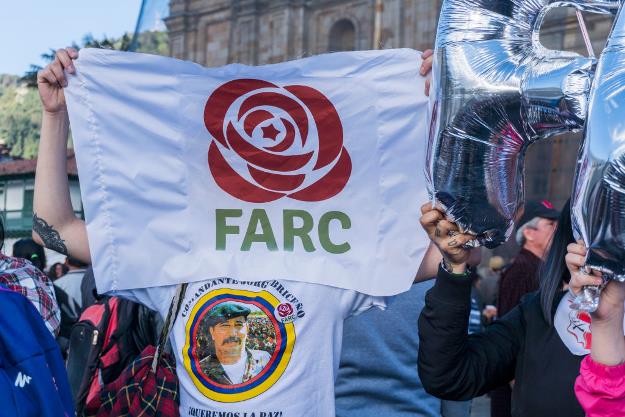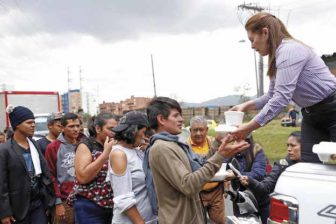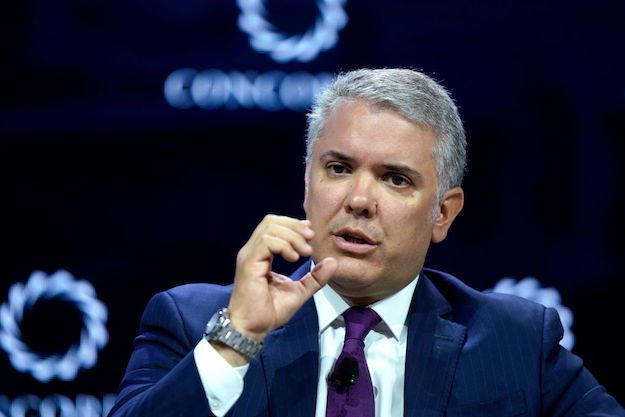The Revolutionary Armed Forces of Colombia’s (FARC) move into politics came to the accordion-rich tune of vallenato.
On Sept. 1, the former armed group held a free concert for supporters in Bogotá’s historic Simón Bolívar square, capping off a week-long conference that confirmed its transformation into a full-fledged political party. Many of the 10,000 or so in attendance traveled across Colombia to take part in the celebration – and bear witness to the first day of the FARC’s political future.
“My hope is that the FARC can become the party that stands up to the corruption in our country,” said Didzon Pineta, a community leader from the border city of Cúcuta, who attended the event. “This country needs to change, the FARC can be that change.”
But despite such optimism, the FARC will soon be facing a harsh reality: After more than 50 years of war, hundreds of thousands dead and millions displaced, politics – and potential voters – won’t come easy.
“The FARC just isn’t ready for the rough-and-tumble of a big national political campaign,” said Adam Isacson, the senior fellow for defense oversight at the Washington Office on Latin America, who has spent decades studying Colombia.
Isacson noted a variety of reasons why the FARC’s short-term political prospects don’t look good. The ongoing peace process means details about the group’s past crimes will come to light even as the country prepares for elections in 2018; the FARC’s far left association with the collapsing “Venezuelan model” next door is also likely to scare off potential voters.
And that’s before taking into account the group’s dismal reputation among average Colombians: Just 15 percent of the country views the FARC favorably, according to a recent Gallup poll, and 64 percent believe the group will fail to make good on its promises as part of the peace deal.
Under the terms of that deal, the FARC is guaranteed five seats in the Lower House and five in the Senate through the end of 2026. They hope to gain more at the ballot box, but will also face stiff opposition from familiar opponents, not least from former President Álvaro Uribe and his hardline Centro Democrático party. Uribe led the fight against approval of the peace deal last year, and still disputes the idea that the FARC has earned the right to participate in national politics. Whoever Uribe promotes as the Centro Democrático’s candidate in 2018 will almost automatically be considered among the frontrunners for the presidency.
Still, the FARC is pushing ahead. Colombian newspaper El Tiempo on Sept. 2 reported that Luciano Marín – better known by his nom de guerre Iván Márquez – will lead the FARC’s political movement, which will comprise a 111-member leadership that will replace the 61-member central command that led the guerrillas during wartime. The group also unveiled a new logo, ditching two crossed AK-47 rifles in favor of a red star surrounded by rose petals. Surprisingly, given the group’s violent history, participants in the conference chose not to discard the FARC acronym, naming their political party the Fuerza Alternativa Revolucionaria del Común (Alternative Communal Revolutionary Forces).
“For some people, FARC is a negative word,” said Marin, “But at the same time it represents our historical continuity, our past … We are going to continue our fight but only in the arena of legal politics.”
For some, that past also offers lessons for the FARC’s political future. In 1985, when the rebels last attempted a move into politics, they were met with bloodshed at the hands of state-aligned paramilitaries. Unión Patriótica, the political party they formed at the time, saw over 2,000 of its members killed. Some rank-and-file FARC members fear history could repeat itself.
“I would like to be a part of the political movement,” said Omaira Solarte from a FARC demobilization camp in Colombia’s southern Putumayo department. “But obviously there’s a fear that we will be hunted down like with the Unión Patriótica.”
This time around, if the FARC can weather early challenges, there may yet be opportunities for success. According to Isacson, the FARC’s organizational capacity and the fact that local elections in 2019 will favor its ability to get out the vote in remote parts of the country are two reasons for the party to be optimistic.
“In the medium term, if they can survive a lousy 2018 outcome, their future may be more solid,” Isacson said.
If it does stay the course, the FARC may be able to join other demobilized groups that have enjoyed at least modest electoral success. The M-19 guerrilla group that demobilized in 1990, and went on to cosign Colombia’s 1991 constitution, included in its ranks Gustavo Petro, Bogotá’s former mayor and a likely presidential candidate in 2018, as well as two current senators.
At the concert in the Simón Bolivar square, that was reason enough not to count out the FARC’s chances at a political life after war.
“The change will be slow, and the media here is against them, but members of other groups have demobilized and been elected,” said Jairo Arango, a university professor who attended the event. “You could describe (the FARC’s) rhetoric as populist, but I see it more as idealistic, and idealism isn’t always a bad thing.”
—
Parkin Daniels is a freelance reporter based in Bogotá








